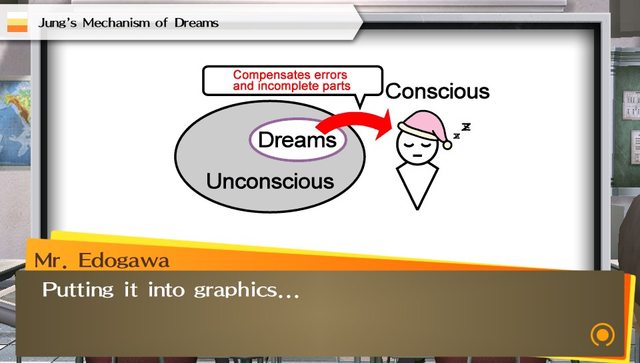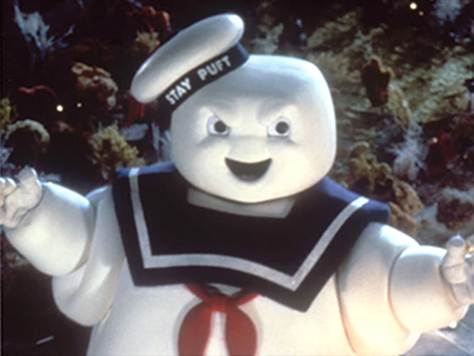Part 154: Lesson 9: Interpreting Dreams
-Specialist-



"Everyone Loves Jungian Psychology!" An invitation to the you that you don't know. We are in the ninth installment, coming up on the home stretch. This time, we're discussing "Interpreting Dreams." Let's begin the lecture. Dein Name ist Rumpelstilzchen...


This time, let's learn about another distinctive feature of Jungian psychology: dream analysis. As the name implies, dream analysis is the study of the psychological meanings behind dreams. This is commonly used as a synonym for Jungian psychology as a whole. Of course, Jung himself used dream analysis to treat his patients. The mysticality and flamboyancy of that idea must make it popular. It's true that dreams are probably the most incomprehensible phenomenon of the human mind...You've already heard me mention dreams before in my previous lectures, right? I said that dreams are proof of the existence of the subconscious. Dreams and the unconscious are very closely related...That will be the starting point of today's lecture.


You remember him, right? Yes, THAT Freud. Freud studied dreams and noticed that there were a lot of elements that "fulfilled the dreamer's desires"...He thought that dreams were phenomena where the desires of the unconscious relapse into the conscious during sleep. To be blunt, you see dreams in order to feel good. I believe Freud's theory is quite convincing...But Jung's view varies a bit from it.


Jung heard about dreams from his patients, as well as recorded and studied his own dreams, in hopes of learning their cause...The core of dreams is the basic property of the mind's functions, something Jung himself theorized. I talked about this with the personality types. Do you remember that? What Jung saw as the mechanism behind dreams is "the mind's ability to compensate." In other words, he believed that dreams occur due to the "power of conscious and unconscious compensating for each other"...I feel like I've been repeating myself, but just one more time: Within the mind, the conscious and the unconscious compensate for each other's imbalances. They try to fix erroneous and incomplete parts of each other. And, one such method of compensation is through dreams.


The unconscious is sending dreams to support the conscious...Just remember that. It's trying to fix erroneous and incomplete parts of the conscious. Dreams are the unconscious' "quip" to the conscious...Maybe that's being too light on the subject. At any rate, just remember that dreams happen to compensate for erroneous and incomplete parts of the conscious.


I'm going to be a little bold and try using more technical terms to describe what I mean here. The dreams that are based on things that you are aware of and help you think about them are called "compensatory." Conversely, "non-compensatory" dreams are ones that can help you to sort out potential problems from external sources. Non-compensatory dreams don't reflect the conscious mind, but can still be helpful in their own way. Those are the "complete" dreams, the dreams that your unconscious delivers to the conscious...There are also "incomplete" versions that get shown to the conscious as well. There are "reiterative dreams," which show events from real life. It's pretty much your memory replaying itself. "Physiological dreams" are dreams you have because of physical influences on your body while you're sleeping. So, to recap: compensatory and non-compensatory dreams, along with reiterative and physiological dreams. You don't need to remember all that in detail. Just remember that there are several types and levels of dreams.

You forgot one.

*twitch* *twitch* I see our students are getting better; I didn't expect this comment from any of you. I wasn't going to bring this up, but now it looks like I don't have a choice. So prepare yourselves and listen up!


"Prophetic dreams." The other types had explanations that made sense, although it may take some effort to figure them out...But it's hard to give a reasonable explanation of prophetic dreams. Prophetic dreams predict the future. But, there is no explanation given as to how anyone can predict events that they have no way of possibly knowing. Some trick...an erroneous report...Even after going through these, Jung was left with the fact that they do exist. However, instead of denying or ignoring that type of dream, he tried to expound upon it. In the process, he began to look for the existence of telepathic power...But that's for another time. So, you see, there are some dreams that not even Jung was able to explain...Jung's achievements span all sorts of places, so it's easy to go off-track. Let's get back to dream analysis.


I don't blame you. Is it really possible...? Let's say you had a certain dream, and continue on from there. For this example, you've had a dream in which your father turned into a lizardman. And at the dinner table, old Lizard-Dad is sitting there like normal, talking about the next vacation you'll take. After seeing this powerful image, you feel that this dream has to mean something and search for an answer. So, you check books and search the web for things about lizards in dreams, looking for template interpretations. But, Jung warned that this interpretation is only a one-sided analysis. After all, lizards might hold some deep personal meaning to you that isn't the same as other people's. So, continuing on with the lizard dream...Hm? Are lizards too creepy? Should I change Lizard-Dad into a marshmallow man for this example?


Let's stay with Lizard-Dad.

That lizard might be a representation formed by the unconscious mind to express something creepy, an enemy...But it might be something other than the common image. Maybe you like lizards, or the first lizard you saw impressed you...In other words, your personal "lizard" may not be the "lizard" that other people perceive in their unconscious.


Without figuring out the difference, you'll have a hard time figuring out what your dreams are trying to say. That is to say, your unconscious is calling out to you, but you either aren't hearing it or are taking it the wrong way. Jung proposed a method to solve this problem. That method is "association." In this method, you ask the individual to expand on the personal experiences they have with the images in dreams. In regards to the lizard..."What do you think of when you hear the word 'lizard?'" "What did it look like? What do you remember about it?" Basically, you talk with the person and expand on the meaning of the dream, leading to deeper interpretation.


Just as dreams are stories created by the unconscious for the individual...He took notice that there were stories created by the unconscious for "the collective." Those stories are "ancient mythology." He advocated the method of comparing dreams to myths. This is known as "amplification." If a dream in question is hard to interpret by personal experience, looking at similar myths may lend a hint about its meaning. Not only myths, but fairy tales and the like are also used...Using these past examples and archives, you would supplement the dreams and interpret them.


Long conversations and personal counseling are necessary, and the analyst must be proficient. I must say that dream interpretation is not an easy task. Quick interpretations may be fun, but they lack credibility. While it is important to lend your ear to the unconscious...Being tied down by an inexperienced interpretation would actually make the dream harmful...Now then, it looks like it's time. And that's it for today.


 "Everyone Loves Jungian Psychology!" An invitation to the you that you don't know. We are in the ninth installment, coming up on the home stretch. This time, we're discussing "Interpreting Dreams." Let's begin the lecture. Dein Name ist Rumpelstilzchen...
"Everyone Loves Jungian Psychology!" An invitation to the you that you don't know. We are in the ninth installment, coming up on the home stretch. This time, we're discussing "Interpreting Dreams." Let's begin the lecture. Dein Name ist Rumpelstilzchen...
 This time, let's learn about another distinctive feature of Jungian psychology: dream analysis. As the name implies, dream analysis is the study of the psychological meanings behind dreams. This is commonly used as a synonym for Jungian psychology as a whole. Of course, Jung himself used dream analysis to treat his patients. The mysticality and flamboyancy of that idea must make it popular. It's true that dreams are probably the most incomprehensible phenomenon of the human mind...You've already heard me mention dreams before in my previous lectures, right? I said that dreams are proof of the existence of the subconscious. Dreams and the unconscious are very closely related...That will be the starting point of today's lecture.
This time, let's learn about another distinctive feature of Jungian psychology: dream analysis. As the name implies, dream analysis is the study of the psychological meanings behind dreams. This is commonly used as a synonym for Jungian psychology as a whole. Of course, Jung himself used dream analysis to treat his patients. The mysticality and flamboyancy of that idea must make it popular. It's true that dreams are probably the most incomprehensible phenomenon of the human mind...You've already heard me mention dreams before in my previous lectures, right? I said that dreams are proof of the existence of the subconscious. Dreams and the unconscious are very closely related...That will be the starting point of today's lecture.
 You remember him, right? Yes, THAT Freud. Freud studied dreams and noticed that there were a lot of elements that "fulfilled the dreamer's desires"...He thought that dreams were phenomena where the desires of the unconscious relapse into the conscious during sleep. To be blunt, you see dreams in order to feel good. I believe Freud's theory is quite convincing...But Jung's view varies a bit from it.
You remember him, right? Yes, THAT Freud. Freud studied dreams and noticed that there were a lot of elements that "fulfilled the dreamer's desires"...He thought that dreams were phenomena where the desires of the unconscious relapse into the conscious during sleep. To be blunt, you see dreams in order to feel good. I believe Freud's theory is quite convincing...But Jung's view varies a bit from it.
 Jung heard about dreams from his patients, as well as recorded and studied his own dreams, in hopes of learning their cause...The core of dreams is the basic property of the mind's functions, something Jung himself theorized. I talked about this with the personality types. Do you remember that? What Jung saw as the mechanism behind dreams is "the mind's ability to compensate." In other words, he believed that dreams occur due to the "power of conscious and unconscious compensating for each other"...I feel like I've been repeating myself, but just one more time: Within the mind, the conscious and the unconscious compensate for each other's imbalances. They try to fix erroneous and incomplete parts of each other. And, one such method of compensation is through dreams.
Jung heard about dreams from his patients, as well as recorded and studied his own dreams, in hopes of learning their cause...The core of dreams is the basic property of the mind's functions, something Jung himself theorized. I talked about this with the personality types. Do you remember that? What Jung saw as the mechanism behind dreams is "the mind's ability to compensate." In other words, he believed that dreams occur due to the "power of conscious and unconscious compensating for each other"...I feel like I've been repeating myself, but just one more time: Within the mind, the conscious and the unconscious compensate for each other's imbalances. They try to fix erroneous and incomplete parts of each other. And, one such method of compensation is through dreams.
 The unconscious is sending dreams to support the conscious...Just remember that. It's trying to fix erroneous and incomplete parts of the conscious. Dreams are the unconscious' "quip" to the conscious...Maybe that's being too light on the subject. At any rate, just remember that dreams happen to compensate for erroneous and incomplete parts of the conscious.
The unconscious is sending dreams to support the conscious...Just remember that. It's trying to fix erroneous and incomplete parts of the conscious. Dreams are the unconscious' "quip" to the conscious...Maybe that's being too light on the subject. At any rate, just remember that dreams happen to compensate for erroneous and incomplete parts of the conscious.
 I'm going to be a little bold and try using more technical terms to describe what I mean here. The dreams that are based on things that you are aware of and help you think about them are called "compensatory." Conversely, "non-compensatory" dreams are ones that can help you to sort out potential problems from external sources. Non-compensatory dreams don't reflect the conscious mind, but can still be helpful in their own way. Those are the "complete" dreams, the dreams that your unconscious delivers to the conscious...There are also "incomplete" versions that get shown to the conscious as well. There are "reiterative dreams," which show events from real life. It's pretty much your memory replaying itself. "Physiological dreams" are dreams you have because of physical influences on your body while you're sleeping. So, to recap: compensatory and non-compensatory dreams, along with reiterative and physiological dreams. You don't need to remember all that in detail. Just remember that there are several types and levels of dreams.
I'm going to be a little bold and try using more technical terms to describe what I mean here. The dreams that are based on things that you are aware of and help you think about them are called "compensatory." Conversely, "non-compensatory" dreams are ones that can help you to sort out potential problems from external sources. Non-compensatory dreams don't reflect the conscious mind, but can still be helpful in their own way. Those are the "complete" dreams, the dreams that your unconscious delivers to the conscious...There are also "incomplete" versions that get shown to the conscious as well. There are "reiterative dreams," which show events from real life. It's pretty much your memory replaying itself. "Physiological dreams" are dreams you have because of physical influences on your body while you're sleeping. So, to recap: compensatory and non-compensatory dreams, along with reiterative and physiological dreams. You don't need to remember all that in detail. Just remember that there are several types and levels of dreams. You forgot one.
You forgot one. *twitch* *twitch* I see our students are getting better; I didn't expect this comment from any of you. I wasn't going to bring this up, but now it looks like I don't have a choice. So prepare yourselves and listen up!
*twitch* *twitch* I see our students are getting better; I didn't expect this comment from any of you. I wasn't going to bring this up, but now it looks like I don't have a choice. So prepare yourselves and listen up!
 "Prophetic dreams." The other types had explanations that made sense, although it may take some effort to figure them out...But it's hard to give a reasonable explanation of prophetic dreams. Prophetic dreams predict the future. But, there is no explanation given as to how anyone can predict events that they have no way of possibly knowing. Some trick...an erroneous report...Even after going through these, Jung was left with the fact that they do exist. However, instead of denying or ignoring that type of dream, he tried to expound upon it. In the process, he began to look for the existence of telepathic power...But that's for another time. So, you see, there are some dreams that not even Jung was able to explain...Jung's achievements span all sorts of places, so it's easy to go off-track. Let's get back to dream analysis.
"Prophetic dreams." The other types had explanations that made sense, although it may take some effort to figure them out...But it's hard to give a reasonable explanation of prophetic dreams. Prophetic dreams predict the future. But, there is no explanation given as to how anyone can predict events that they have no way of possibly knowing. Some trick...an erroneous report...Even after going through these, Jung was left with the fact that they do exist. However, instead of denying or ignoring that type of dream, he tried to expound upon it. In the process, he began to look for the existence of telepathic power...But that's for another time. So, you see, there are some dreams that not even Jung was able to explain...Jung's achievements span all sorts of places, so it's easy to go off-track. Let's get back to dream analysis.
 I don't blame you. Is it really possible...? Let's say you had a certain dream, and continue on from there. For this example, you've had a dream in which your father turned into a lizardman. And at the dinner table, old Lizard-Dad is sitting there like normal, talking about the next vacation you'll take. After seeing this powerful image, you feel that this dream has to mean something and search for an answer. So, you check books and search the web for things about lizards in dreams, looking for template interpretations. But, Jung warned that this interpretation is only a one-sided analysis. After all, lizards might hold some deep personal meaning to you that isn't the same as other people's. So, continuing on with the lizard dream...Hm? Are lizards too creepy? Should I change Lizard-Dad into a marshmallow man for this example?
I don't blame you. Is it really possible...? Let's say you had a certain dream, and continue on from there. For this example, you've had a dream in which your father turned into a lizardman. And at the dinner table, old Lizard-Dad is sitting there like normal, talking about the next vacation you'll take. After seeing this powerful image, you feel that this dream has to mean something and search for an answer. So, you check books and search the web for things about lizards in dreams, looking for template interpretations. But, Jung warned that this interpretation is only a one-sided analysis. After all, lizards might hold some deep personal meaning to you that isn't the same as other people's. So, continuing on with the lizard dream...Hm? Are lizards too creepy? Should I change Lizard-Dad into a marshmallow man for this example?
 Let's stay with Lizard-Dad.
Let's stay with Lizard-Dad. That lizard might be a representation formed by the unconscious mind to express something creepy, an enemy...But it might be something other than the common image. Maybe you like lizards, or the first lizard you saw impressed you...In other words, your personal "lizard" may not be the "lizard" that other people perceive in their unconscious.
That lizard might be a representation formed by the unconscious mind to express something creepy, an enemy...But it might be something other than the common image. Maybe you like lizards, or the first lizard you saw impressed you...In other words, your personal "lizard" may not be the "lizard" that other people perceive in their unconscious.
 Without figuring out the difference, you'll have a hard time figuring out what your dreams are trying to say. That is to say, your unconscious is calling out to you, but you either aren't hearing it or are taking it the wrong way. Jung proposed a method to solve this problem. That method is "association." In this method, you ask the individual to expand on the personal experiences they have with the images in dreams. In regards to the lizard..."What do you think of when you hear the word 'lizard?'" "What did it look like? What do you remember about it?" Basically, you talk with the person and expand on the meaning of the dream, leading to deeper interpretation.
Without figuring out the difference, you'll have a hard time figuring out what your dreams are trying to say. That is to say, your unconscious is calling out to you, but you either aren't hearing it or are taking it the wrong way. Jung proposed a method to solve this problem. That method is "association." In this method, you ask the individual to expand on the personal experiences they have with the images in dreams. In regards to the lizard..."What do you think of when you hear the word 'lizard?'" "What did it look like? What do you remember about it?" Basically, you talk with the person and expand on the meaning of the dream, leading to deeper interpretation.
 Just as dreams are stories created by the unconscious for the individual...He took notice that there were stories created by the unconscious for "the collective." Those stories are "ancient mythology." He advocated the method of comparing dreams to myths. This is known as "amplification." If a dream in question is hard to interpret by personal experience, looking at similar myths may lend a hint about its meaning. Not only myths, but fairy tales and the like are also used...Using these past examples and archives, you would supplement the dreams and interpret them.
Just as dreams are stories created by the unconscious for the individual...He took notice that there were stories created by the unconscious for "the collective." Those stories are "ancient mythology." He advocated the method of comparing dreams to myths. This is known as "amplification." If a dream in question is hard to interpret by personal experience, looking at similar myths may lend a hint about its meaning. Not only myths, but fairy tales and the like are also used...Using these past examples and archives, you would supplement the dreams and interpret them.
 Long conversations and personal counseling are necessary, and the analyst must be proficient. I must say that dream interpretation is not an easy task. Quick interpretations may be fun, but they lack credibility. While it is important to lend your ear to the unconscious...Being tied down by an inexperienced interpretation would actually make the dream harmful...Now then, it looks like it's time. And that's it for today.
Long conversations and personal counseling are necessary, and the analyst must be proficient. I must say that dream interpretation is not an easy task. Quick interpretations may be fun, but they lack credibility. While it is important to lend your ear to the unconscious...Being tied down by an inexperienced interpretation would actually make the dream harmful...Now then, it looks like it's time. And that's it for today.